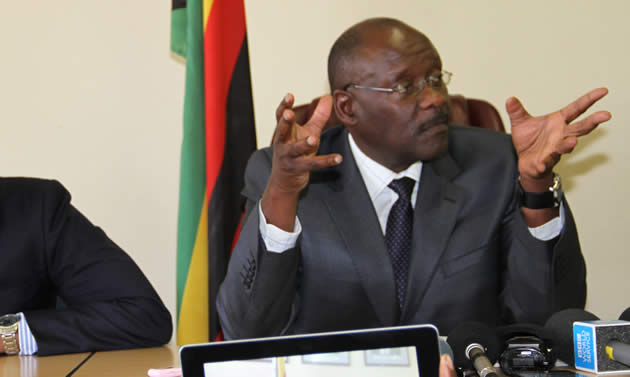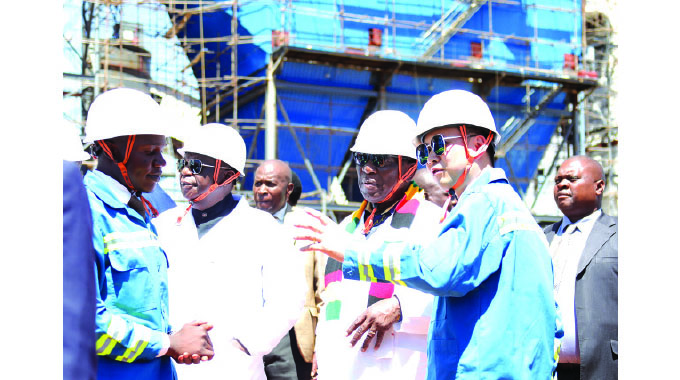‘A healthy populace critical to Zim-Asset’

The interview Roselyne Sachiti
ZIMBABWE is one of the countries that have scored some success against the HIV and Aids epidemic. Statistics say an estimated 1 168 263 people are living with the disease with over 80 percent of them under anti-retroviral treatment. Over the years, Zimbabwe has made tremendous strides in halving the HIV prevalence
rate. Features Editor Roselyne Sachiti (RS) spoke to Minister of Health and Child Care Dr David Parirenyatwa (DP) on this and other issues on the sidelines of the 20th International Aids Conference in Melbourne, Australia.
RS: Dr Parirenyatwa, you lost your mother just last week and most people expect you to be mourning back home. Why is it important for you to attend the 20th International Aids Conference at such an emotional time?
DP: This is an important conference for us. I buried my mother on Friday and came here days later. As you know, the Aids conference comes at a regular interval when in Zimbabwe we are fighting HIV in a very successful manner. We need to continue to interact with others and be abreast of the thinking of what is happening elsewhere. If you lose this opportunity you do not easily get another where everyone gathers and various workshops take place. In the workshops are teachings and discussions that can help the country. Also the conference does not come again in two years so missing out on it means the country misses out on a number of new research findings.
You need to be here and abreast as a Zimbabwean and push our agenda to others and get a mirror of what is happening.
RS: What is Zimbabwe’s agenda at AIDS 2014?
DP: Our major agenda is to push our people’s needs. The needs for Zimbabweans are to increase the coverage of ARVs particularly the single dose. I have met with some anti-retroviral drug manufacturers, who are willing to partner with Zimbabwe to produce in a big way. I had a meeting with Indian manufacturer, Myland.
It is important that they come in at this stage because Zimbabwe is looking at Zim-Asset. It will be an investment in manufacturing and job creation, but also in sustaining our people’s lives in terms of HIV.
We want them to partner with us. Then we expect to get at first a local assembly of drugs at a cheaper rate than others. Then we want to manufacture ARVs in Zimbabwe in a bigger and regional representative way.
RS: Could you please update our readers on the progress on the discussions so far?
DP: Discussions are still ongoing and I am sure that we will get a lot of support from within the country and from within Government.
We want them immediately and have no reason to delay this. Speed is of the essence hence this should be done as soon as possible. I think we are ripe for that as Zimbabweans. The big advantage is we can export and also create employment for our people. The second agenda we are pushing is to be in consummate with the push of eradicating HIV.
RS: How is Zimbabwe faring on MDG 6 (Combat Aids, Malaria and other diseases)?
DP: We have done very well in terms of halving the prevalence and that is a landmark to it. The provision of ARVs has gone a long way except that now the viral load we used to recognise at 350 but now we have raised it to 500. This has pushed up the number of people who should access ARVs. Our aim is to consider putting everyone who tests HIV positive on ART especially newborn children. The country recently adopted Option B+ in pregnant women found to be HIV positive and we are quite ready. In fact it’s an entry point for us.
RS: Youths have been left out in most programmes. What is your ministry doing to close the gaps?
DP: We want to target various segments of the population like youths and institutions of higher learning and the informal sector in areas like Siya So, Mupedzanhamo among others. I know growth points have been tackled but we need a programme of approaching those in urban areas in terms of advocacy, testing and counselling and, of course, it’s a big pool for ARVs.
I am glad the chairperson of the National Aids Council is here and this is an area I want him to co-ordinate immediately. I know the youths are being tackled here and there. We want a systematic approach to youths both in institutions of higher learning and unemployed ones, but particularly the informal sector.
RS: Now that you are talking of engaging the informal sector. How far have you gone to ensure they also contribute to the Aids levy?
DP: It’s an issue that has been discussed. It’s an issue I am engaging NAC on and trying to get what formula and options we can use. We are considering this area very seriously because everyone will benefit in a healthier Zimbabwe and the informal sector should be able to participate in their own health.
RS: Male circumcision is one of the interventions discussed at this conference and even back home the health sector is promoting this drive? Where do we stand in terms of success and failures?
DP: In the beginning of the year, the male circumcision programme had not done so well. The takers were fewer than anticipated. There are concerted efforts to continue to promote MC. But, I have always said that it is only one in the package of tools not on its own. In other words, I am saying being circumcised does not make you a torch that can light anywhere. It’s part of a package and we were initially disturbed when people thought they were safe from HIV infection once circumcised. The proper message should continue to go as we push the male circumcision agenda.
RS: Other issues being discussed here include access to health services to youths in terms of condoms and contraceptives. What is the Zimbabwean situation? What measures have been put in place to ensure universal access? What is government policy?
DP: We have always said and continue to say unless there is policy change is in schools we still promote advocacy and education including sexual health education/ sexual and reproductive health from an early age Grade 4 upwards. But, in institution of higher learning like universities, we have been doing advocacy and also pushing for the use of condoms. We are not yet advocating the use of condoms in primary and secondary schools. No condoms for schools.
RS: What would you like to take home from this conference? What has been the most interesting session?
DP: What has touched me is the mindset of eradicating HIV in our generation. That mindset is there. We should look inside ourselves as countries whether we can fund our own programmes more than what we are doing now. There is no doubt that the so-called international funders are now saying that’s your problem. And at this conference, the subtle part is the international funders are now looking at what they have been contributing and analysing how efficiently it is being used. Can we do more with the funding we have been getting?
This is an area I will look at when we go home. Is the National Aids Trust Fund, Global Fund being used efficiently? Can we make better use of it and also look at issues of youths, rape, gender based violence, child sexual abuse and the attendant problems. It’s striking that various workshops being done to tackle this.
As we look at HIV, we should not isolate the strengthening of the health systems. Do not look at HIV in a silo mentality. We have malaria, diabetes, high blood pressure, etc.






Comments